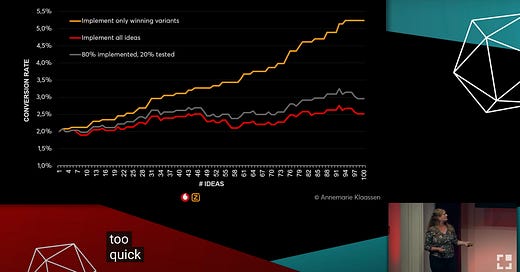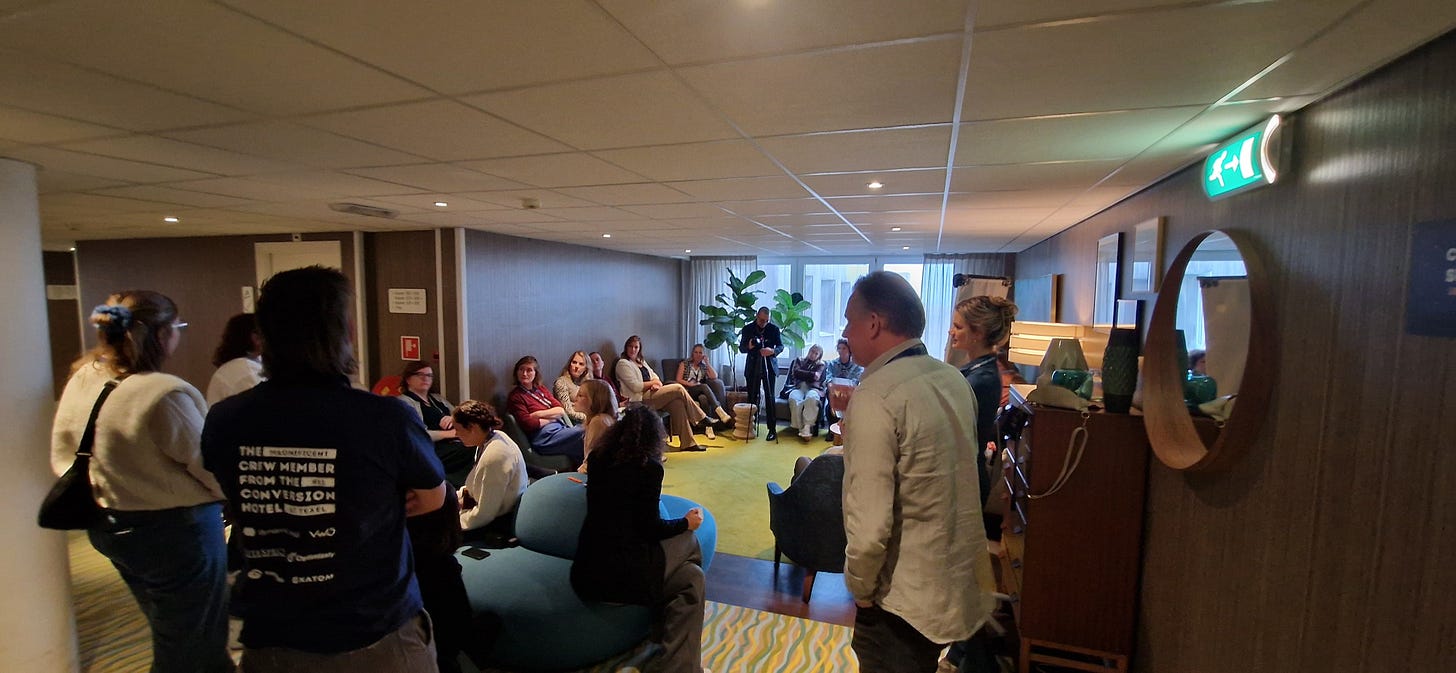November's Vault 🔓🏦 ✨
Treating your CRO Program as a Product and building a CoE, Email A/B testing, valuing yourself $$ and free experimentation tools.
How to value yourself — salary wise
A hot topic in our channel 🔥 bc, asking for money can be tough. Whatever you do, remember that when you’re working for a company you’re taking care of THEM by spending your time, using your knowledge, etc. The way they should take care of you is by paying you a fair amount of money.
One super valuable resource is Experiment Nation’s Salary Benchmark. You can find out if you’re being paid fairly, by comparing to others.
Tracy Laranjo shares that she valued herself more when she started to see herself as a business. “I can work for so many different companies, and if they are not giving me the best rate combined with the best environment, then I’ll go to the next highest bidder. (…) I stopped looking at my employers as they owe me and I owe them.” Watch full video here
How about consultants?
Marcella Sullivan responded: “a few factors IMO - client, complexity/nature of work (and your experience in the exact type of work) and length of engagement. Based on these factors ranges can be £50-£200/hour. A general rule - ask for 20% more than you think you're worth. Lowball yourself and they will accept it but if they want you and your rate is too high they will negotiate. This can be harder if you are competing with other consultants but if someone reaches out to you remember they want you!”
Lucia van den Brink: “When I just started I named a number I was comfortable with. Every new client I got, I added 10 euro. Also, for small projects I ask a higher rate, because having more projects makes me do more task hopping, and I need to divide my attention, while I like focus.”
Best content this month 🔓 ✨
#1 Treat Your CRO Program as a Product
Annemarie Klaassen wanted to make VodafoneZiggo the new ‘Booking.com’ — ‘a girl can dream, right?’
What happend when she was building the Center of Excellence:
Adding more people doesn’t necessarily mean more tests
About 30% of your ideas are good ideas - but which ones…?
Don't underestimate the power of advertising (for your CRO program)
#2 Reorder your product line-up
🔥 The order of pricing plans matters, explains Ninsiima Rukandema in her post.
Most pricing plans are traditionally displayed from cheapest to most expensive, however this study flipped the order putting the most expensive first and the results were really interesting in the study done by Ben Labay. Users were more likely to engage with and prefer higher priced plans when they were listed first.
#3 Low traffic? Maximize CRO efforts with:
1️⃣ 𝗖𝗼𝗺𝗯𝗶𝗻𝗲 𝘁𝗲𝘀𝘁𝘀 𝗮𝗰𝗿𝗼𝘀𝘀 𝗺𝘂𝗹𝘁𝗶𝗽𝗹𝗲 𝗽𝗮𝗴𝗲𝘀: If you have a page element that is consistent across multiple pages, you can test that element across those pages to amplify the volume. This approach allows you to gather more data points and reach statistical significance faster.
2️⃣ 𝗠𝗮𝗸𝗲 𝗯𝗶𝗴𝗴𝗲𝗿 𝗰𝗵𝗮𝗻𝗴𝗲𝘀: With lower volume, it's advisable to make more substantial changes to your test variations. Larger changes are more likely to produce noticeable differences in conversion rates, allowing you to reach statistical significance in a reasonable amount of time.
3️⃣ 𝗣𝗮𝗿𝘁𝗻𝗲𝗿 𝘄𝗶𝘁𝗵 𝗼𝘁𝗵𝗲𝗿 𝗶𝗻𝘁𝗲𝗿𝗻𝗮𝗹 𝘁𝗲𝗮𝗺𝘀: Collaborate with marketing teams to leverage their campaigns. When there are planned spikes in traffic due to email campaigns or other marketing initiatives, use those opportunities to run your tests.
4️⃣ 𝗙𝗼𝗰𝘂𝘀 𝗼𝗻 𝗵𝗶𝗴𝗵-𝘁𝗿𝗮𝗳𝗳𝗶𝗰 𝗽𝗮𝗴𝗲𝘀: Prioritize testing on pages that already receive a significant amount of traffic.
5️⃣ 𝗨𝘀𝗲 𝗱𝗮𝘁𝗮-𝗱𝗿𝗶𝘃𝗲𝗻 𝗽𝗿𝗶𝗼𝗿𝗶𝘁𝗶𝘇𝗮𝘁𝗶𝗼𝗻: Utilize data to prioritize your experiments, focusing on areas that are most likely to yield meaningful results based on current traffic patterns and user behavior.
6️⃣ 𝗖𝗼𝗻𝘀𝗶𝗱𝗲𝗿 𝗹𝗼𝗻𝗴𝗲𝗿 𝘁𝗲𝘀𝘁 𝗱𝘂𝗿𝗮𝘁𝗶𝗼𝗻𝘀: While it's important to balance time and impact, sometimes allowing tests to run for longer periods can help accumulate enough data for meaningful insights, especially for tests with potentially significant business impact.
7️⃣ 𝗨𝘀𝗲 𝗱𝗶𝗿𝗲𝗰𝘁𝗶𝗼𝗻𝗮𝗹 𝗱𝗮𝘁𝗮: In some cases, it may be necessary to make business decisions based on directional data rather than waiting for full statistical significance.
8️⃣ 𝗟𝗲𝘃𝗲𝗿𝗮𝗴𝗲 𝘀𝗲𝗴𝗺𝗲𝗻𝘁𝗮𝘁𝗶𝗼𝗻: Even with low overall traffic, you may be able to identify specific user segments that provide more meaningful data.
#4 Is Imposter Syndrome really perfectionism?
Daphne Tideman shared a quiz that lets you figure out what kind of perfectionist you are. Most people are a mix of perfectionism, and it might be that Imposter Syndrome has a little bit to do with it…
What do you think? 🔒 Link to convo - ladies only.
#5 Product Pros on How to Ace Annual Planning
”Original research is non-negotiable. Put together a team if you can … and go after qual/quant data. You are sitting on both. You just don’t know it." - Trina Moitra, Head of Growth at Convert
“Look at the bottlenecks. Really look at the data and work out where the biggest area of improvement needs to be. That’s a full-funnel analysis of each step of the customer journey.” - Rosie Hoggmascall, Fractional Head of Growth and Founder at Growth Dives
#6 Have a Shopify store? You can’t ignore these apps…
full post here by Laura Robinson
Most valued Q&A’s 🔓 ✨🤓
How to get started with email split tests?
Jayne Carmichael Norrie: “For small business I recommend Sendfox, it has some tools to test the email subject line and gives recommendations on how to optimise it. (…) but apparently their largest tier is for an audience of 25k. (…)
There are A/B testing options also in Converkit(Kit), Active Campaign, etc.Emily Isted: Klaviyo is great for AB testing email campaigns! Super simple UI and reporting.
What are some free testing tools to consider?
Leonie Madder answered: “I work for an agency where more clients are interested in a/b testing and split url testing, but also surveys for example. Price is an issue in this start-up phase, since we have "not yet" proven what it yields (we are of course working on a business case for this, but the price scares clients). The agency partnership model of VWO seems to lower the price somewhat.
In addition, we looked at PostHog, but the self-hosted version is described as "hobby-like" and does not meet our requirements. The paid version is just as expensive as VWO.
Another option that is now being reviewed is Growthbook. It seems to meet the requirements for feature flags and easy front-end testing. Data can be exported to GA4 and BQ. However, these tools (Post Hog and Growthbook) do not (I guess) contain the sample size calculations, hypothesis testing and significance calculations.”Silvia: “ABLyft is free too, but only for 10K MTU.”
Should our book club be revived or not?
🔒 Link to convo - ladies only.
WIE get-together at Conversion Hotel
We hosted a break-out session sharing success career stories at Conversion Hotel last weekend. There were stories about: not working full time and thát being succesful, daring to move on to another company when things don’t feel right, getting rejected for speaking at our summit (sorry!) but gaining the confidence to move forward, etc etc etc. Thanks everyone for being there ❤️ .
John Ostrowski helped us document it with video — hopefully we’ll be able to share it soon. Big thanks to him and his passionate filming. These pictures is all we have for now 👇
Give some love to…
Our UpSpeak Competition with Convert is still going strong. Content is getting better and better 🥵 and someone even got 2 leads through Linkedin💪 .
❤️ Even if you have only 0,01% time, click one name and like or comment. Simple thing, big impact. 👇
This year we have a category for new AND experienced Linkedin folks. All participants: Rosie Hoggmascall, Veronika Morozova, Ekaterina Gamsriegler, Steph le Prevost, Carmen Albisteanu, Aly Balmes, Georgiana Hunter-Cozens, Atisha B, Marinell Falcon, Viivika Lumberg, Parmeet Kaur, Haliena Brown, Lucy Fabian, Taylor Tseng, Shilpa Bharti, Atisha Banjare, Caroline Brewer, Ninsiima Rukandema, Ioana Iordache, Christine Bookless and Laura Robinson.
Thanks so much!
See you next month 🎃
Love,
Marcella, Daphne and Lucia
p.s. subscribe to support us & tell your friends »







